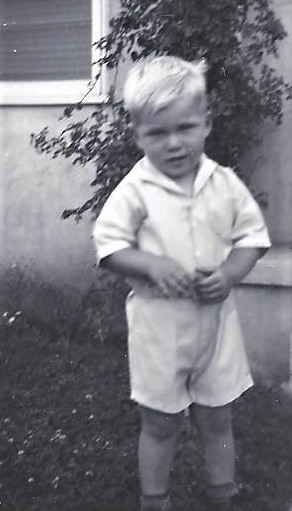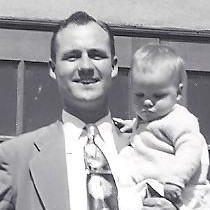Some folks said Blow me down! meant to hit me or knock me down; but that might not be correct. The phrase goes back the late 1700s, and is a statement that sailors said in a windstorm. A windy place in Nova Scotia was called Cape Blow-me-down, which evolved through time to Cape Blomidon.
Blow me down! eventually became a phrase used when someone was surprised. A relatively new version is, That blows my mind!

Wind is an interesting atmospheric action. It can be gentle for kite-flying; moderate for turning wind-turbines; strong can blow over trucks and trailers; or powerful such as tornados and hurricanes. The story this week is about the third group: strong winds.
Carol and I arrived in La Luz, a small town near Alamogordo, New Mexico on Sunday to visit friends, and planned to head east on Wednesday. But watching the evening news report, we learned that a tremendous windstorm was heading our way. It would hit on Tuesday and turn violent on Wednesday. We considered leaving on Thursday, but snow was forecast for Thursday night and Friday. Our last option was to leave a day early.

So, we toured the space museum in Alamogordo on Monday and toured the Tularosa Museum on Tuesday morning, then headed east up the mountain to Cloudcroft. La Luz is 4,761 feet above sea level and Cloudcroft is 8,668. It was quite a climb, but our car was up to the challenge. Pulling the trailer, I put the 6.2L, 380 HP, 8-speed engine in gear #4 and it was an easy pull up the mountain. Several other cars, pulling no trailers, had stopped beside the road to let their engines cool down, but our engine heat indicator barely moved.
We stopped in Cloudcroft to look at the scenery and have an early dinner, and the winds began greatly increasing. We hugged our friends, bid them adios, and headed east to Hobbs, NM which was projected to be on the fringe of the storm.
When we had the opportunity to watch the news, we learned that our departure was directed by the Lord. The wind blowing through one of the passes going into the Alamogordo basin reached over 100 mph. Remember: hurricane winds begin at 70 mph.
When thinking of the danger of driving in windy situations, we need to consider sustained wind and wind gusts. If the wind is blowing around 20-30 mph, gusts may reach 40 or 50 mph; and although it can be a rocky ride, it is normally safe. Wind advisories are put out if the sustained winds surpass 30 mph. But if the sustained wind reaches 50 mph, gusts may easily reach 60-75, and we may be in trouble.

The gusts are the worst part of the storm because the intermittent pressure can set up sideways trailer motion called oscillations which can cause a turnover.
Having said all that, the simple decision was: if the sustained wind is 50 mph or higher, park the car and trailer. But if we must drive, here are several ideas to consider.
- Drive slower: decreased speed decreases the wind pressure.
- Use a lower gear: more power on the drive wheels at a slower speed can compensate for some of the crosswinds.
- Whether car, trailer, or truck, secure the cargo: a moveable center of gravity can result in losing balance.
- Keep a safe distance behind the guy ahead: if either one of us goes over, we don’t want to hit someone or get hit.
- Back to basics: if possible, stay off the road. Losing time is less expensive than repairing or replacing the car, trailer, and cargo; and a lost life cannot be replaced.
There are other kinds of storms of life. Some of these storms are political, health, weather, financial, and interpersonal; and God sends us storms for our personal growth. Knowing a storm was about to brew, Jesus told his disciples to go to the other side of the sea (Matthew 14:22-24) because they needed to learn how to trust the Master. Read the story: it’s interesting.
Sometimes we are dragged into storms by others, and we need wisdom to handle the situation. But many times, we generate our own storms by foolishness and disobedience. An example is when Jonah tried to run from God (Jonah 1:1-4).
Whatever kind of storm we encounter, let’s stop; assess the situation; and ask God for wisdom. He will guide us if we listen. He guided us back in New Mexico.











 Over coffee, his black and mine with cream and sugar, I asked Sean to think about it. “Is the boss being irrational, mean-spirited, or offensive? Or are you reacting to something else?”
Over coffee, his black and mine with cream and sugar, I asked Sean to think about it. “Is the boss being irrational, mean-spirited, or offensive? Or are you reacting to something else?” presenting ideas which at times are opposing or unknown to the listener. It is bringing themes, ideas, plans together for comparison and discussion. But people often take a defensive posture and turn confrontation into angry disagreement, resulting in antagonistic action or sullen withdrawal. It can devolve into explosive verbal – and sometimes physical – altercation.
presenting ideas which at times are opposing or unknown to the listener. It is bringing themes, ideas, plans together for comparison and discussion. But people often take a defensive posture and turn confrontation into angry disagreement, resulting in antagonistic action or sullen withdrawal. It can devolve into explosive verbal – and sometimes physical – altercation. Be gentle after being firm. (2 Cor. 7:8-15) It’s easy for people to get entrenched in their positions and for tempers to flare, voices to rise, and body language to become defensive. Build on mutual respect and understanding. And don’t be afraid of humor or laughing. Scripture says laughing often helps as much as medicine does. Be willing to forgive. Without forgiveness, resolving conflict is impossible.
Be gentle after being firm. (2 Cor. 7:8-15) It’s easy for people to get entrenched in their positions and for tempers to flare, voices to rise, and body language to become defensive. Build on mutual respect and understanding. And don’t be afraid of humor or laughing. Scripture says laughing often helps as much as medicine does. Be willing to forgive. Without forgiveness, resolving conflict is impossible. “Okay – we’ve taken Sharon and Jim to the airport. What would you like to do next?” (The year was 2016.)
“Okay – we’ve taken Sharon and Jim to the airport. What would you like to do next?” (The year was 2016.) spotted a place called Beach Terrace Inn. “I wonder how much they charge for a night’s stay.” Translated into a man’s language, it actually means, “Find out how much it costs to stay here.” Yes, Ma’am.
spotted a place called Beach Terrace Inn. “I wonder how much they charge for a night’s stay.” Translated into a man’s language, it actually means, “Find out how much it costs to stay here.” Yes, Ma’am. flashy.” Carol and I found that to be true.
flashy.” Carol and I found that to be true. Cats are my favorite land animal, and I talk with them. No, I am not weird. I have learned to meow like kittens and cats. I can snarl a little like them too. Let me tell you about a special cat.
Cats are my favorite land animal, and I talk with them. No, I am not weird. I have learned to meow like kittens and cats. I can snarl a little like them too. Let me tell you about a special cat. night visit.
night visit. Don’t do it on the floor. Okay?” Tiger agreed with a soft, “Meow.”
Don’t do it on the floor. Okay?” Tiger agreed with a soft, “Meow.” Tiger with me as long as I needed him because Tiger was God’s gift of healing to my hurting soul. But, also in His love for me, God allowed Tiger to leave when I was emotionally well enough and mature enough to re-attach with my siblings and parents. God loves us and brings into our lives special gifts at crucial times.
Tiger with me as long as I needed him because Tiger was God’s gift of healing to my hurting soul. But, also in His love for me, God allowed Tiger to leave when I was emotionally well enough and mature enough to re-attach with my siblings and parents. God loves us and brings into our lives special gifts at crucial times. Allen responded, “It won’t do anything. It’s been working fine through all my research and writing. But now I’m ready to print my report for the symposium at Washington, DC. I gave the computer a command to print, but it just sat there. I pushed the print command several times and nothing. I think the hard drive crashed.”
Allen responded, “It won’t do anything. It’s been working fine through all my research and writing. But now I’m ready to print my report for the symposium at Washington, DC. I gave the computer a command to print, but it just sat there. I pushed the print command several times and nothing. I think the hard drive crashed.”

 happens to you.” and Proverbs 3:5 – “Seek God’s will in all you do, and he will direct your paths.”
happens to you.” and Proverbs 3:5 – “Seek God’s will in all you do, and he will direct your paths.” Scripture is inspired by God and is useful to teach us what is true and to make us realize what is wrong in our lives. It corrects us when we are wrong and teaches us to do what is right. God uses it to prepare and equip his people to do every good work.”), not all conclusions in the field of psychiatry and psychology are correct.
Scripture is inspired by God and is useful to teach us what is true and to make us realize what is wrong in our lives. It corrects us when we are wrong and teaches us to do what is right. God uses it to prepare and equip his people to do every good work.”), not all conclusions in the field of psychiatry and psychology are correct. Dr. Charles Allen (United Methodist minister, deceased) who received an honorary doctorate from John Brown University, and is author of “God’s Psychiatry” said, “When you say a situation or a person is hopeless, you are slamming the door in the face of God.” However, people must not give up on life, but neither should we demand what God is not giving.
Dr. Charles Allen (United Methodist minister, deceased) who received an honorary doctorate from John Brown University, and is author of “God’s Psychiatry” said, “When you say a situation or a person is hopeless, you are slamming the door in the face of God.” However, people must not give up on life, but neither should we demand what God is not giving. reality, and said, “A load has been lifted from my shoulders; thank you for helping me accept the truth.” And that reflects another statement from Dr. Allen: “The mind is like the body. It can be wounded.
reality, and said, “A load has been lifted from my shoulders; thank you for helping me accept the truth.” And that reflects another statement from Dr. Allen: “The mind is like the body. It can be wounded.  Chuck was facing the reality of his wife’s immanent departure. Was the situation truly hopeless? The answer was a resounding “No.” Death is not the end of the story. Those who trust God with their lives will be given eternal life.
Chuck was facing the reality of his wife’s immanent departure. Was the situation truly hopeless? The answer was a resounding “No.” Death is not the end of the story. Those who trust God with their lives will be given eternal life.